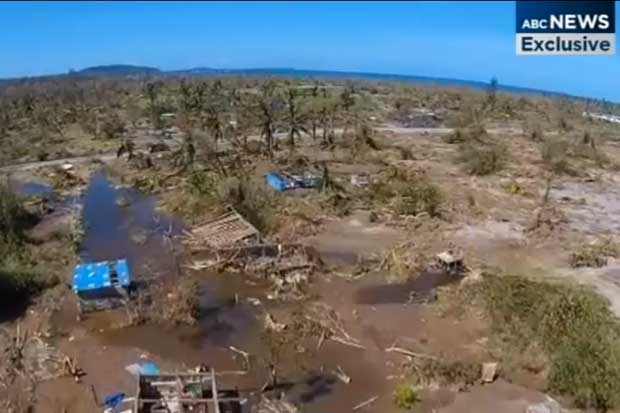Countries like Australia and New Zealand may have to provide special humanitarian visas and put in place international evacuation plans as less developed nations in the region are hit by “disasters on steroids” occurring as a result of man-made climate change, the United Nations has been told.
In a submission to the UN’s World Humanitarian Summit, the UNSW’s Kaldor Centre for International Refugee Law has warned the impacts of anthropogenic warming are already being felt in the region, and that governments must prepare for large population displacements as the intensity of natural disasters increases.
“The people most affected are generally the most vulnerable already – the poor, living in environmentally precarious parts of the country, without the social networks or resources to get out of harm’s way early,” a written submission by the Centre’s director Jane McAdam said.
“Humanitarian assistance in the aftermath of disasters is essential, but it is ultimately a band-aid solution and is not enough.
“The cost of inaction will be higher than the cost of implementing measures to reduce displacement now, both in financial and human terms.”
Simon Bradshaw, Climate Change Advocacy Coordinator at Oxfam Australia, said it was not clear what ongoing support Australia was providing to Pacific nations to help them deal with the threat of climate change.
“There really is not a lot of talk of climate change in the budget,” he said.
“There are no signs that the government is placing sufficient recognition of the escalating risks of climate change. We would like to see this more clearly factored into the aid program.”
In late 2014, the Coalition government announced it would contribute $200 million to the UN’s Green Climate Fund, which assists developing nations tackle climate change.

While welcoming the decision, Bradshaw described the contribution as “modest” and said Australia would be under pressure at the upcoming Paris climate summit to prove it had done enough for developing nations.
Pacific leaders have spoken out in recent months, at times begging the rest of the world to provide assistance.
In March, Vanuatu was devastated by Cyclone Pam, which triggered an humanitarian crisis and displaced 70 per cent of the island’s population.
According to an Oxfam report, a joint NGO-UN climate change adaption program in the country “saved lives, strengthened community resilience, and will remain integral to the process of rebuilding”.
As the global number of asylum seekers surges, fuelled by conflict in Syria, Iraq, and Afghanistan, natural disasters are also displacing millions.
“In 2013, almost three times as many people were newly displaced by disasters than by conflict – around 22 million people,” McAdam’s submission said.
A ‘Scoping Paper’ put together for the World Humanitarian Summit echoed similar concerns, and said the Pacific region was one of the most disaster-prone in the world.
“Five of its countries are among the top 15 most at risk of disasters globally and eight out of 20 countries in the world with the highest average annual disaster losses by GDP are Pacific island countries.”
It said the combination of “fragile states”, “unplanned urbanisation”, and changes to global weather patterns were putting people at increasing humanitarian risk.
While acknowledging the strong history of migration in the Pacific, the report warned of “well-founded fears that the impacts of climate change will threaten the very existence and identity of low-lying island states in the Pacific region, leading to climate-induced displacement as inhabitants are forced to permanently relocate elsewhere on an increased scale.”
McAdam’s submission said available evidence indicated that the majority of people fleeing disasters return home once the threat subsides, and as a result special short-term humanitarian visas could be one way to assist them.
Aside from helping with finance, building local resilience, and investing in renewable energy in neighbouring states, Bradshaw said Australia must focus on decarbonising its own economy.
Donate To New Matilda
New Matilda is a small, independent media outlet. We survive through reader contributions, and never losing a lawsuit. If you got something from this article, giving something back helps us to continue speaking truth to power. Every little bit counts.



